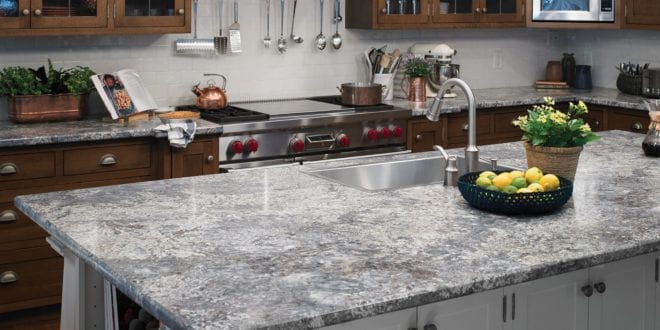A kitchen countertop is a major fixture and serves a major role in the kitchen. Some of the notable functions that a countertop serves include storage area, cutting surface, and even aesthetic value in the home.
There are many different materials that can be used for kitchen countertops. Every material is selected depending on its characteristics and suitability for use in the kitchen. Some popular countertop materials are granite and laminate depending on your budget. Granite may be popular but is expensive whereas laminate is a budget-friendly choice. We will have a look at the advantages and disadvantages of these two countertop materials and help you in selecting the best material for your kitchen.
Laminate vs Granite Countertops: Finishes and Appearance
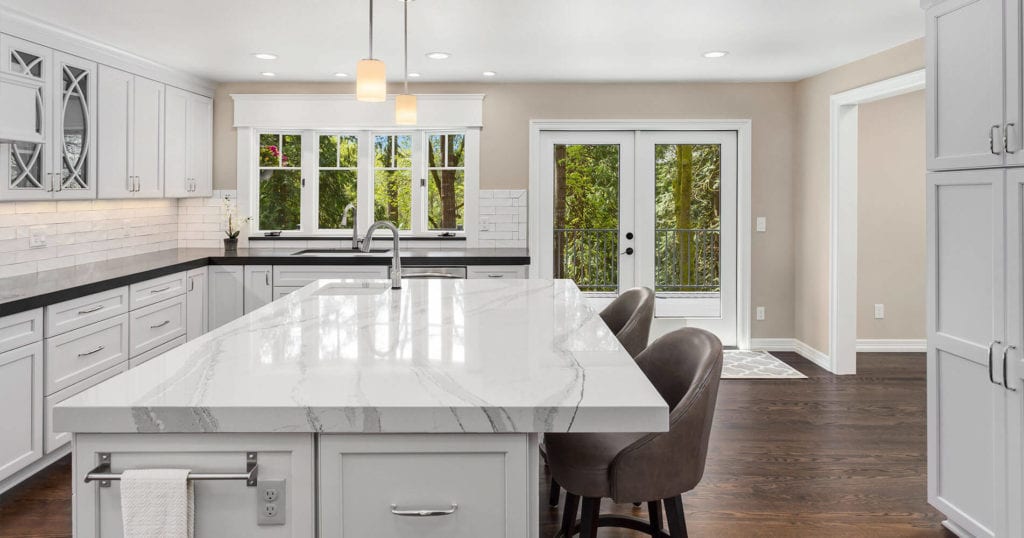
Granite countertops are popular with homeowners and are natural stone composed of quartz, silica, and feldspar. Granite is available in different colors and patterns and no two slabs are similar in appearance.
The differences between slabs are based on varying mineral composition even when the stone is quarried in the same location. Differences in grain patterns are the reason for the unique charm and beauty of granite counters. Through polishing, heating, and honing, weaker surface particles can be removed to give the surface a textured finish and different edge designs. The color options for granite counters are limited. You may read more about granite compared to other materials as well here.
Laminate countertops are manufactured from wood and paper products that are bound together with glue or resin and are then laminated or coated with a plastic surface. The color of a laminate counter is determined by the manufacturer. Design patterns and colors are uniforms making it easy to match your kitchen counters surfaces and even overall kitchen décor. Color options can be used to produce panels of laminates that look like granite.
Laminate Vs Granite Countertops: Installation Process
Granite slabs are specially fabricated for use as kitchen counters. After you have selected a slab that fits with your kitchen design, the fabricator will cut the stone to fit. Granites slabs being natural stone are quite heavy and will require reinforced cabinets to support its weight. It is possible to install under-mount sinks with granite slabs and it should be done not more than 24 hours later to allow time for the epoxy to cure over a two-week period.
Laminate countertop costs are lower making it install since they are bought either pre-cut or can be cut on-site. You can be in a position to install laminate counters as a DIY project for smaller kitchens. Laminate counters can be installed and ready within a single day.
Cost of Slabs and Installation Costs
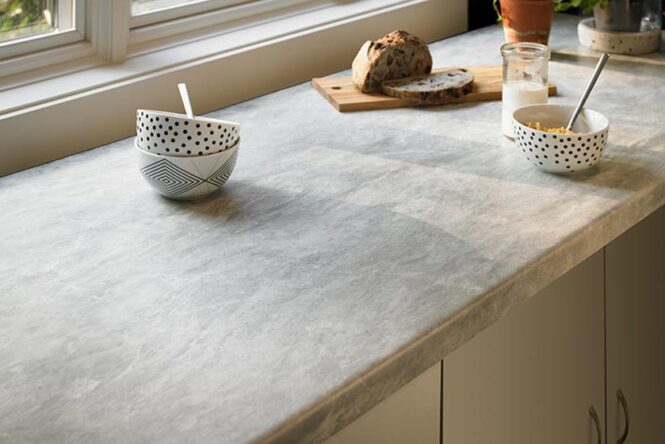
Granite slabs are measured and sold by square foot. Besides the initial cost of buying slabs, you will have to keep in mind edging costs and sink cutout costs. Granite is installed by professionals which is associated with a higher cost of installation.
Laminate is mostly sold in the form of panels but can also be measured by the square foot. The laminate countertop costs of installation are significantly lower compared to that of granite. High end vinyl coatings are laminates that look like granite and significantly increase the price of a laminate panel.
Strength and Toughness
Granite is a natural stone that is hard enough to withstand great force. However, not all forms of granite are equally strong. Black granites rank among the strongest stones whereas light colored granites are comparatively weaker. Granite is classified from classes A to D depending on their strength. Class D granite is the weakest and should not be installed as an overhang or without underlayment since it is prone to breaking without adequate support.
Laminates are not as strong and tough as granite but will serve the purpose as a countertop without the fear of breaking. Laminates can also be used as an overhang without cracking or sagging.
Laminate Vs Granite Countertops: Durability
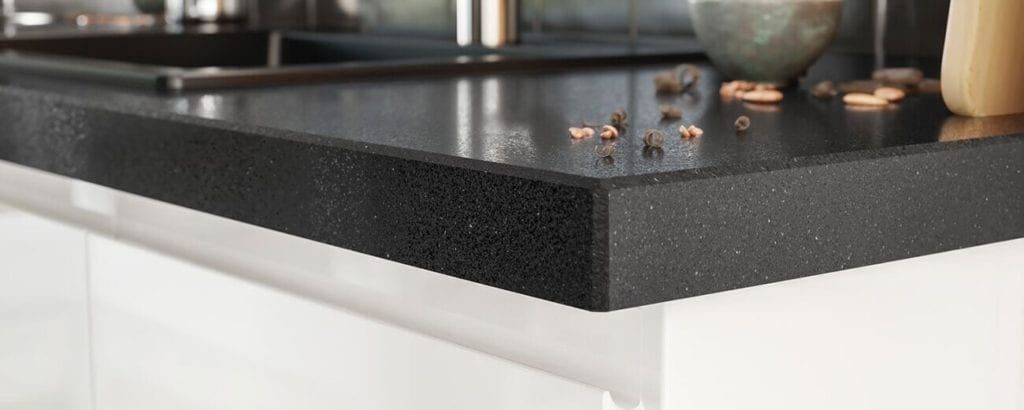
The durability of both granite and laminate counters is such that they can withstand daily use for many years. Granite is resistant to scratches and staining and with proper care can last a lifetime. Some light-colored granite slabs may be porous and prone to etching and staining when exposed to different substances. With proper care, granite countertops can last a lifetime.
Laminates are non-porous and will therefore not stain. However, they are susceptible to scratching and edges may delaminate when exposed to water. On average, laminate counters can last anything between 10 and 12 years with good care. Durability is sacrificed for affordability.
Care and Maintenance
Granite countertops will require maintenance depending on the type of slab chosen. Light-colored slabs require more maintenance to prevent etching and staining. Granite will need to be resealed from time to time to keep it in tiptop shape. Use pH neutral cleaning agents to prevent damage to the granite surface.
Laminate countertops can be cleaned with any preferred non-abrasive cleaner making them a low maintenance choice. Laminate doesn’t require sealing and can be repaired using a kit if the surface is scratched lowering laminate countertop costs of maintenance. Extensive damage to the laminate countertop is irreparable and will necessitate replacing the entire panel.
Heat Resistance
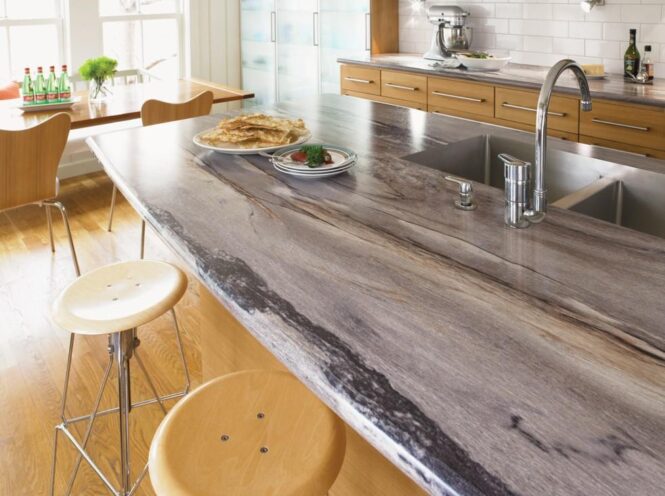
Granite is made of natural stone and is, therefore, heat resistant which implies that pots and pans can be placed directly on the countertop surface without fear of damage.
Laminates are not heated resistant and will suffer heat damage either through blistering or melting. Never place hot pans and pots directly onto a laminate surface to avoid damage and subsequent replacement of panels.
Use as Backsplash
Granite and laminate kitchen countertops can be installed with backsplashes of the same material eliminating the need for tile backsplashes.
A granite countertop and a granite backsplash will be installed by joining with epoxy and setting them into place. The laminate backsplash is integral which implies that it is manufactured as one piece with the countertop which gives a seamless finish.
In conclusion, laminate and granite have their unique characteristics as outlined. It is dependent upon the personal preferences and budget of a homeowner when choosing between laminate and granite countertops. Overall, granite is a more luxurious option for countertops and not far off the mark are laminates that look like granite.
 Imagup General Magazine 2024
Imagup General Magazine 2024
